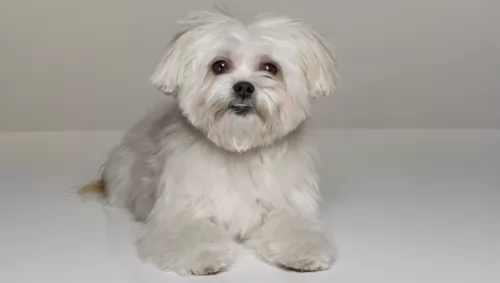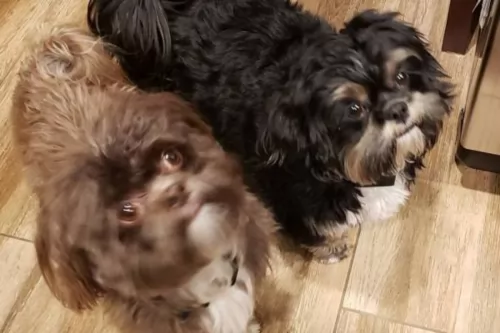 Petzlover
Petzlover Australian Terrier is originated from Australia but Kyi-Leo is originated from United States. Both Australian Terrier and Kyi-Leo are having almost same height. Both Australian Terrier and Kyi-Leo are having almost same weight. Both Australian Terrier and Kyi-Leo has same life span. Both Australian Terrier and Kyi-Leo has almost same litter size. Both Australian Terrier and Kyi-Leo requires Moderate Maintenance.
Australian Terrier is originated from Australia but Kyi-Leo is originated from United States. Both Australian Terrier and Kyi-Leo are having almost same height. Both Australian Terrier and Kyi-Leo are having almost same weight. Both Australian Terrier and Kyi-Leo has same life span. Both Australian Terrier and Kyi-Leo has almost same litter size. Both Australian Terrier and Kyi-Leo requires Moderate Maintenance.
 The Australian terrier, the little terrier, is a breed developed to control vermin. The nature of this dog is very spirited. They are alert, courageous and self-confident but still very human-friendly.
The Australian terrier, the little terrier, is a breed developed to control vermin. The nature of this dog is very spirited. They are alert, courageous and self-confident but still very human-friendly.
Australian terriers were breed by the mix of the Terrier with the rough coat and Scotch Dog of Great Britain. These breeds were mixed until they produced the muscular and fearless dog for the Australian settlers. Their primary job was to control the number of rodents and snakes. They were taught to tend flocks, be an excellent guard dogs but remain friendly. This breed is still very popular as a working dog, loyal companion and dogs for show, city, home or a farm.
 The Kyi-Leo first came about in the 1950s in San Francisco, USA, with the crossing of two dog breeds – the Lhasa Apso and the Maltese.
The Kyi-Leo first came about in the 1950s in San Francisco, USA, with the crossing of two dog breeds – the Lhasa Apso and the Maltese.
Because this is a mixed-breed dog, it isn’t recognized by the American Kennel Club, but it is recognized by some of the other dog associations such as the American Rare Breed Association or ARBA as it is known. Today the dog is looked upon as a designer breed.
 The Australian terrier has body longer than they are tall. They are small dogs with the long and thick coat with silky undercoat and short little legs. This smart-eyes breed is perfect for persons who live indoors. But, you must know that they really like to bark and communicate that way with everybody. They also have a high need for activity so it will be necessary to take him out so he can run, play and be social with other dogs. They are very intelligent, but not very responsive. They will quickly learn how to fetch, but they will have days when they just feel like fetching.
The Australian terrier has body longer than they are tall. They are small dogs with the long and thick coat with silky undercoat and short little legs. This smart-eyes breed is perfect for persons who live indoors. But, you must know that they really like to bark and communicate that way with everybody. They also have a high need for activity so it will be necessary to take him out so he can run, play and be social with other dogs. They are very intelligent, but not very responsive. They will quickly learn how to fetch, but they will have days when they just feel like fetching.
 The Kyi-Leo is a small dog standing at 20 – 30cm in height and weighing in the region of 4 – 6kg.
The Kyi-Leo is a small dog standing at 20 – 30cm in height and weighing in the region of 4 – 6kg.
He has a long, silky coat which is essentially black and white or grey/silver and white or even gold and white. He has frail legs which can become injured or broken in vigorous rough and tumble games.
You can certainly describe the Kyi-Leo as a sweet, quiet, non-aggessive playful dog, and for anyone who wants a splendid pet and companion, this dog makes a great family pet and he won’t cost you an arm and a leg to feed either.
He also has an acute sense of hearing and this turns him into an excellent ‘alarm’ watch-dog. It is also a dog, that while he will love to join you on a walk, he isn’t a dog that is going to demand a lot of exercise.
He responds well to his human family, is easy-going and gentle, tending to be cautious around strangers. You can trust him to be an awesome playmate for children. In this instance, it’s the children who should be warned when playing with a dog like this as, because of his fragile build, he could easily be injured by children who haven’t been taught to respect animals.
Even though he is such an amicable pet, it will still be of benefit to you and him to have him trained and socialized. Then he responds well to basic commands such as sit, stay and lie-down.
Dogs who spend time with their family, pick up on the ‘culture’ of the family and they learn how to behave. Dogs who are left on their own and never socialized can become nervous and aggressive towards people as they never got to learn how to behave – they weren’t socialized.
 The Australian terrier is very good breed to choose if you have children. They are active and always ready to play, and they will protect the children since they have watchdog gene.
The Australian terrier is very good breed to choose if you have children. They are active and always ready to play, and they will protect the children since they have watchdog gene.
Excellent watch dog. This breed will keep your garden and home vermin free.
They are generally very polite towards strangers and highly adaptable among other dogs, but their adaptability in social life is totally up to the human and the training. They can grow to be adaptable dogs that fit well into almost any environment; city or country, house or apartment.
Since they are an intelligent breed, the Australian terrier may surprise you with their ability to learn new tricks and shock you with their ability to be very strong willed about doing what is told. It’s not that they are not the type to obey and be “a good dog”, they are so playful and silly that they will often forget that they are the god and not the human. You must start training them while they are still pups.
 The Kyi-Leo is everything you want in a family companion – active, playful, loving, gentle, happy and balanced.
The Kyi-Leo is everything you want in a family companion – active, playful, loving, gentle, happy and balanced.
He loves his human family but tends to be a little bit wary around strangers, gradually warming to them.
He may be small, but he is robust and alert, and he is also capable of making you a good watchdog.
The Kyi-Leo is an all-round great little pet to have.
 A bone disorder, where the hip joint starts to rot caused by decaying of the femur bone which is located in the dog’s hind limb.
A bone disorder, where the hip joint starts to rot caused by decaying of the femur bone which is located in the dog’s hind limb.
Luxating patella is a knee disease where one or both kneecaps can slip out of place.
Rupture of an important ligament in the knee (stifle) joints.
The brain disorder that is characterized by seizures. There are several different types of epilepsy that can affect dogs.
A chronic disease of the metabolism which is characterised as high glucose amount in the blood. This happens when hormone insulin drops below the normal values. This condition results in malfunction of vital organs.
 Your Kyi-Leo is such a feisty, robust little dog who is not likely to cost you much in terms of health care. With his frail legs, it is a good thing to know that you need to be careful with him in terms of back-and joint problems.
Your Kyi-Leo is such a feisty, robust little dog who is not likely to cost you much in terms of health care. With his frail legs, it is a good thing to know that you need to be careful with him in terms of back-and joint problems.
There are actually knee joint issues which are fairly common in small dogs, one of which is patellar luxation.
This is where the kneecap pops out of the thighbone, causing the dog to skip or hop. Some joint issues are genetic and may require surgery. Make sure to keep your pet’s weight under control to remove additional stress on the joints.
This is another dog illness you want to be careful with. Acute pancreatitis -inflammation - is when the condition comes on suddenly while chronic pancreatitis is when pancreatitis occurs over a period of time.
With acute pancreatitis in dogs you’ll see symptoms such as vomiting, abdominal pain, tremors and reluctance to eat. Pancreatitis can be brought on by too much fat, especially rancid fat, some anti-biotics, a low protein diet or a sickness such as diabetes.
If you suspect pancreatitis in your dog, get him as quickly as possible to the vet.
 Recommended daily amount is usually found on the type of the food you choose. They like dry food, and if you are not quite sure what brand of the dry food you should choose, seek a vet’s advice. The Australian terrier has a healthy appetite, but he almost never overeats. How much your Australian terrier eats depends on his size, age, metabolism, and activity level.
Recommended daily amount is usually found on the type of the food you choose. They like dry food, and if you are not quite sure what brand of the dry food you should choose, seek a vet’s advice. The Australian terrier has a healthy appetite, but he almost never overeats. How much your Australian terrier eats depends on his size, age, metabolism, and activity level.
Their coat requires moderate maintenance. That means that you don’t have to groom your Australian terrier every single day, but being aware of the importance of grooming him at least twice a week is a key because lack of adequate care may lead to skin diseases. Make sure not to bathe them too much, but you can be free with their haircut. They can grow very sharp toenails, so they should be clipped regularly. Ear and teeth must be kept clean.
Lots of outdoor activity. They are lovable kind, so don’t be reserved towards them. It’s important to begin training and socializing your pup as soon as possible. Training sessions need to be consistent, firm, short and clear. Grooming is a must since you will want to prevent the tangles and mats.
Find a place for them where you can take of the leash and let them run free. They love chasing birds, butterflies and anything that flies above. They will chase small rodents, other dogs and cats. After you thought you Australian terrier how to play with other dogs and cats, they will be the most wanted guest in the whole neighbourhood. Find a place where they can dig holes – and they will be so happy that they probably won’t hear you calling them home.
 The Kyi-Leo doesn’t require vigorous exercising. One walk a day will keep them happy. There are pet owners who believe dogs can be permanently outside dogs where they can do their own exercise.
The Kyi-Leo doesn’t require vigorous exercising. One walk a day will keep them happy. There are pet owners who believe dogs can be permanently outside dogs where they can do their own exercise.
Everybody who knows dogs, knows they are social creatures who will simply lie at your backdoor just waiting for some response from their beloved human family. Every dog, regardless of breed or size, needs exercise and interaction with their humans every day.
Dogs left alone in the yard day after day are loney, frustrated and bored, and when they start digging or barking, irresponsible owners will ill treat them. These kind of people should never own a dog.
The Kyi-Leo has a sensitive stomach so he’ll need good quality food to avoid digestive problems. Ideally home-cooked food such as softly boiled chicken, brown rice and raw or cooked vegetables added into top quality kibble is the preferred diet.
Fresh, cool water needs to be constantly available.
Brush the long, silky coat at least twice a week to ensure it remains free of knotting. Brushing keeps the coat shiny too.
As a long eared dog, ears should be checked and cleaned regularly too. Air doesn’t reach the inside of their ears and the warm dampness in the ears are a breeding place for infection.
Nails should also be trimmed when they become long because left uncut they can hook onto things causing injury ad pain.
Small dogs are more prone to tartar formation and loss of teeth. You’ll notice that something isn’t right because your lively little dog will be lethargic, he may not want to eat his food and his face may be swollen. When you suspect dental problems, get him to the vet.